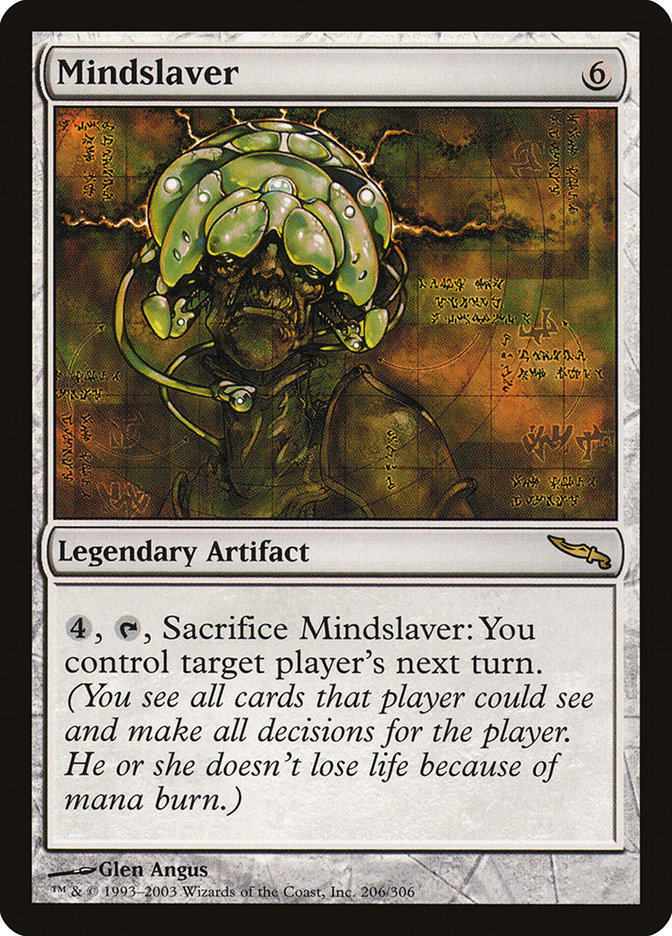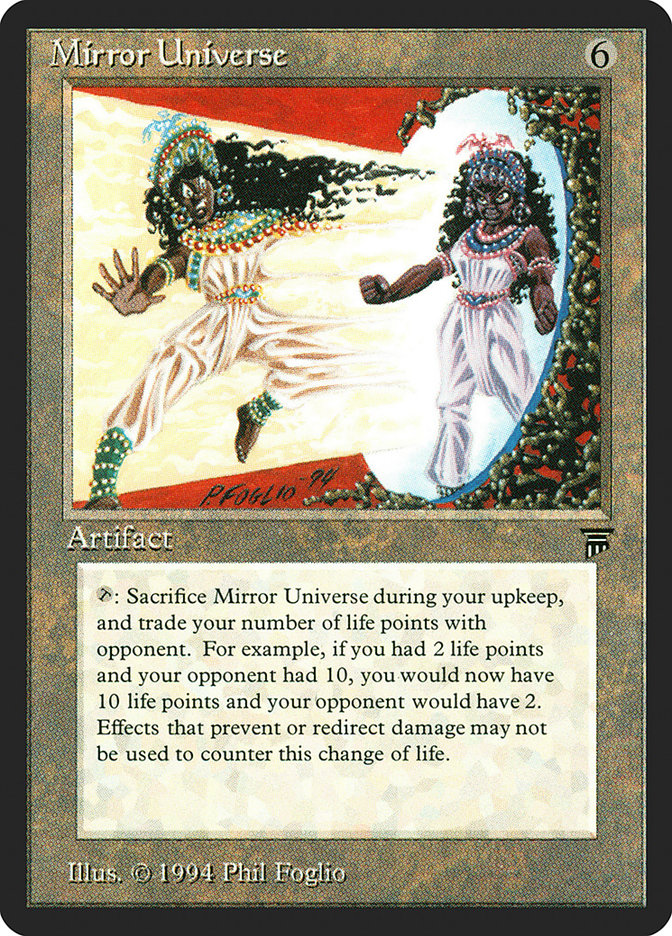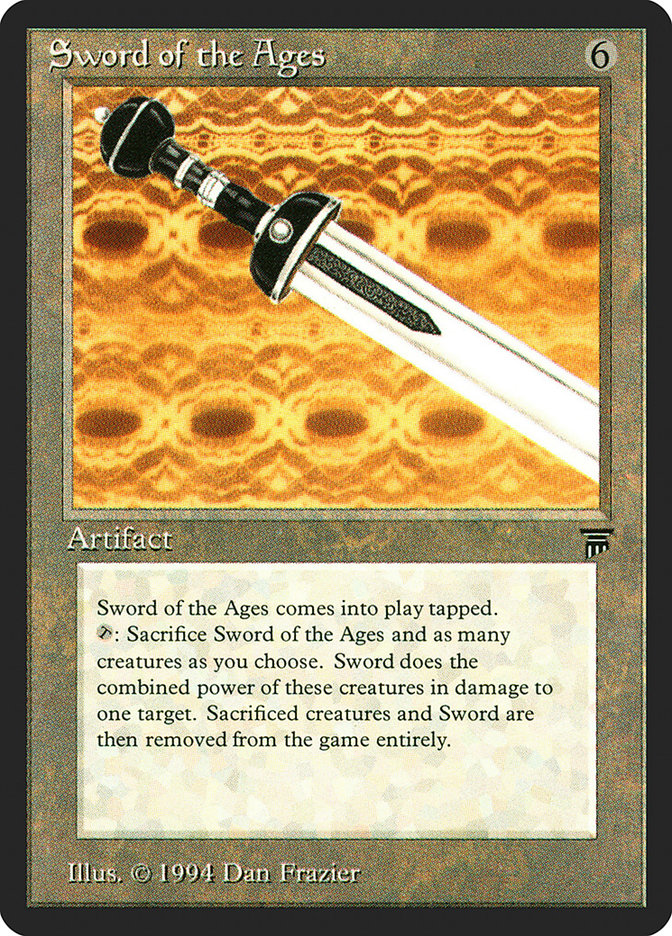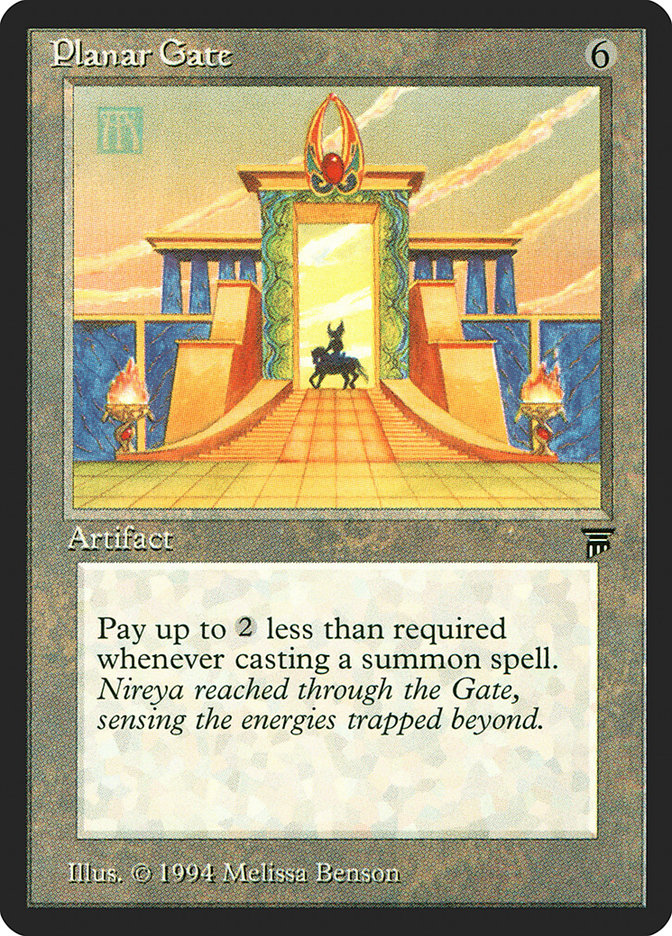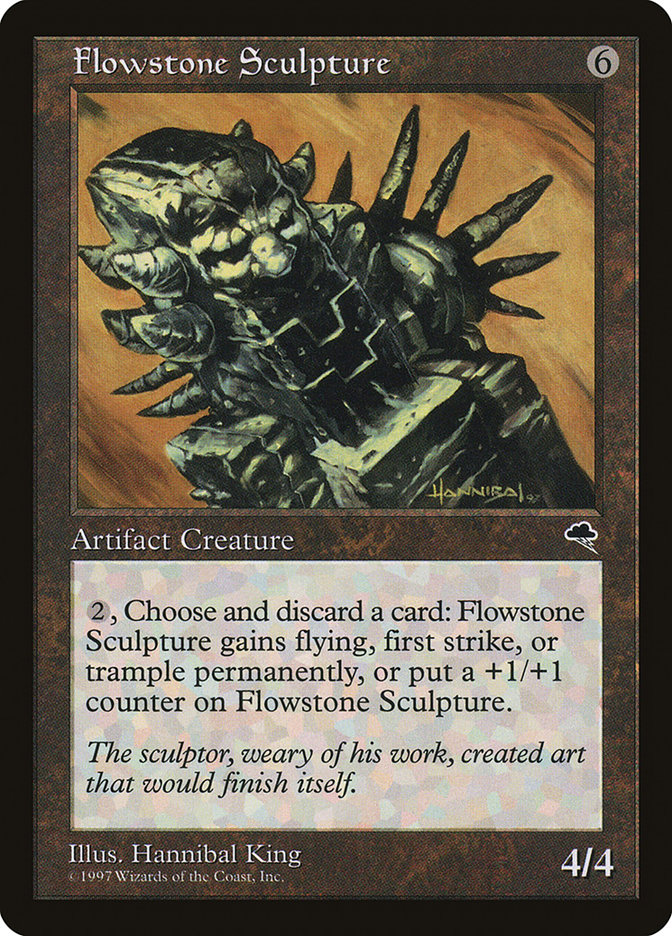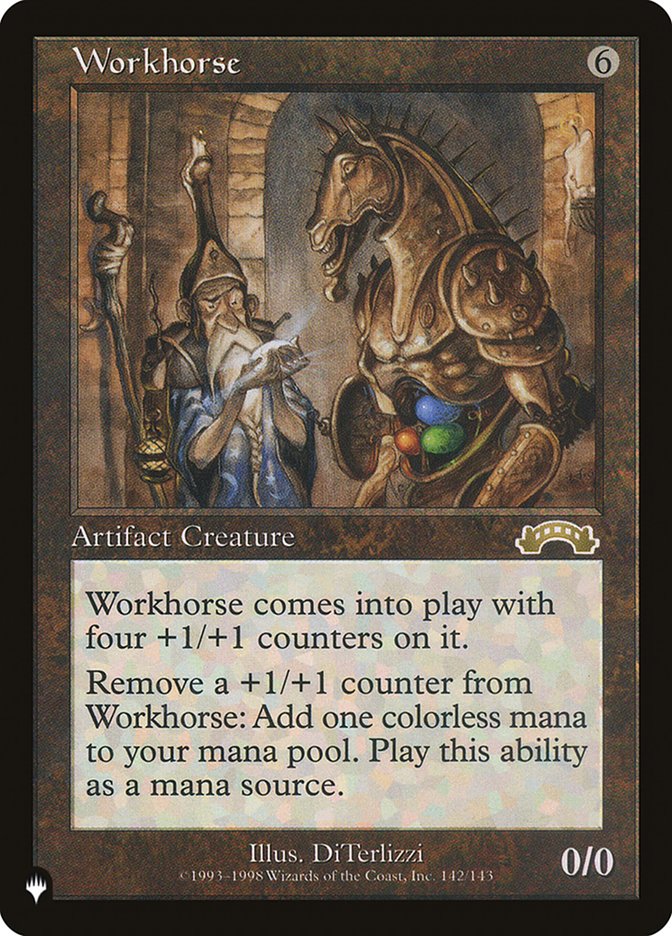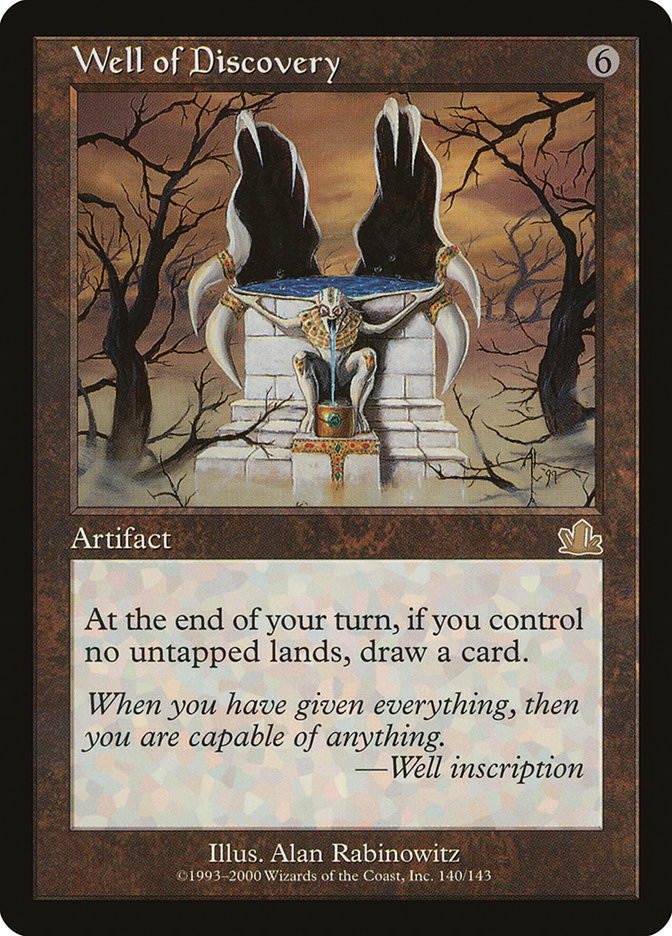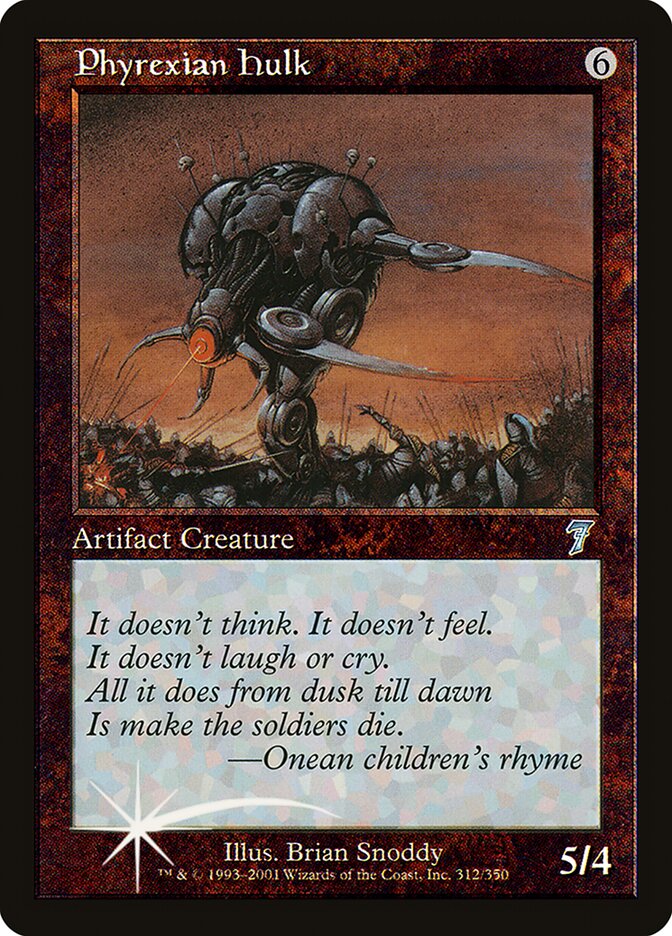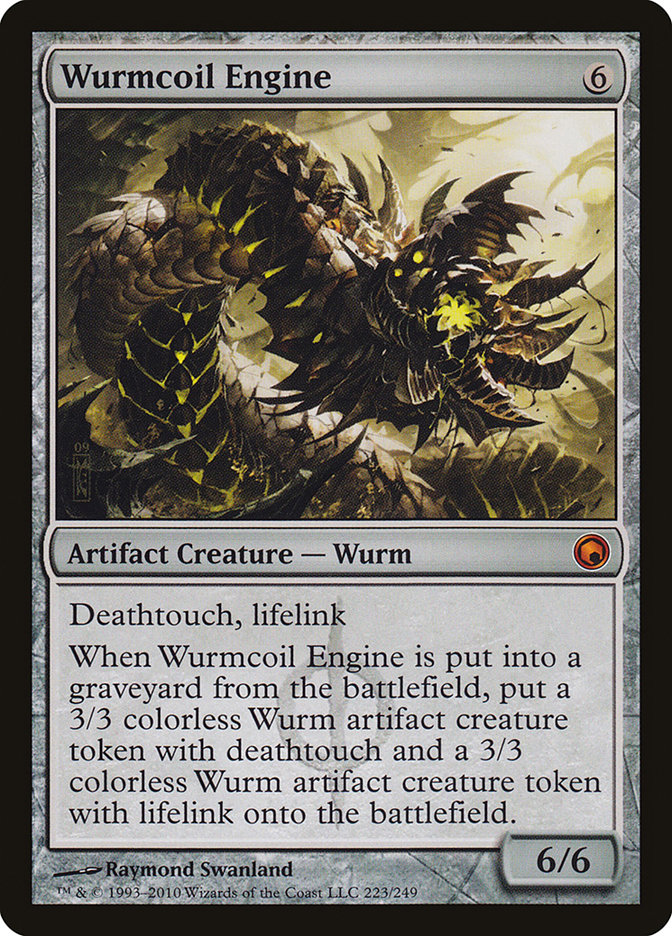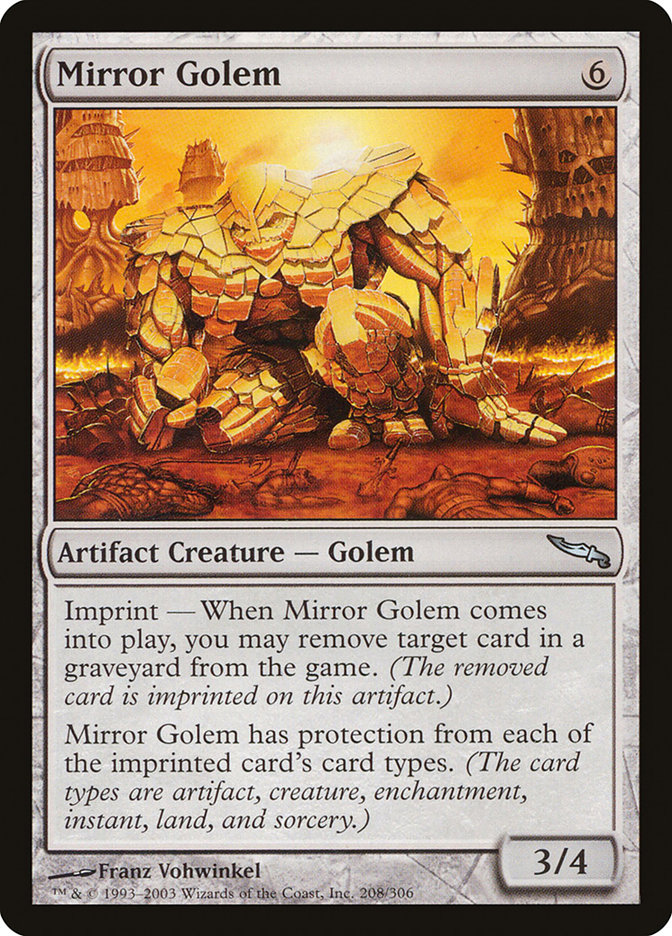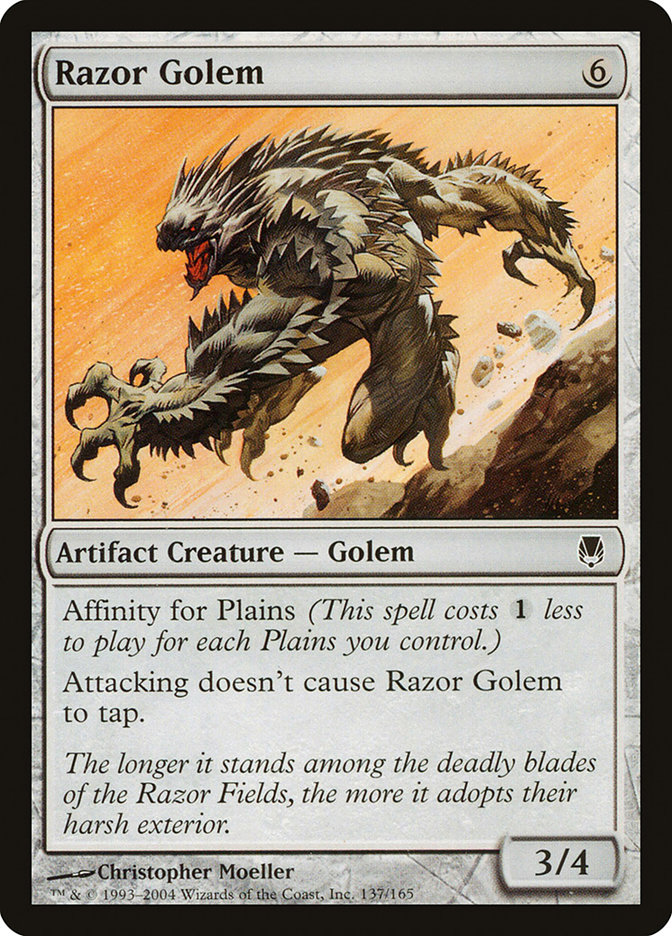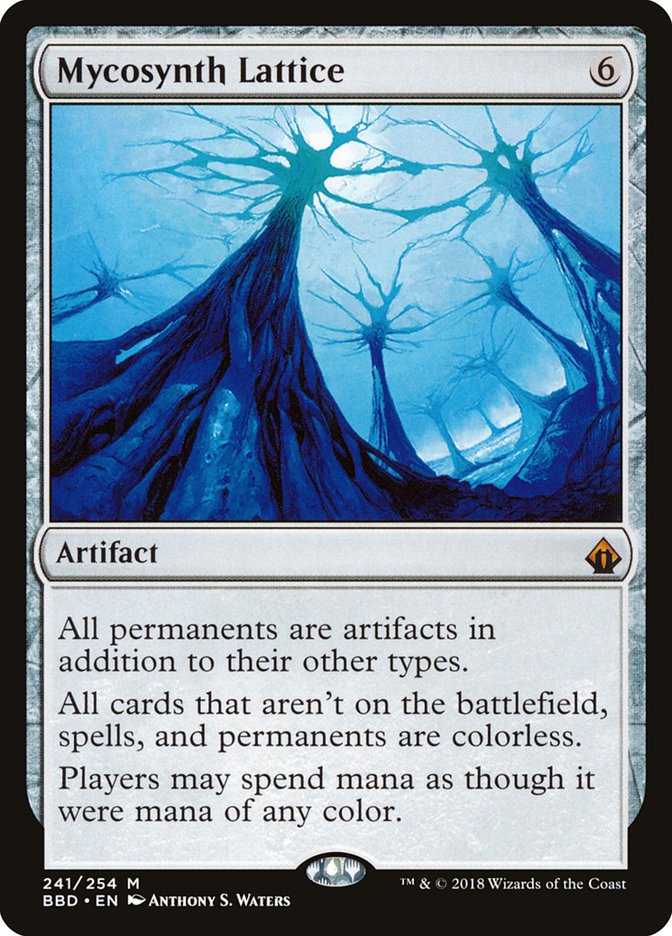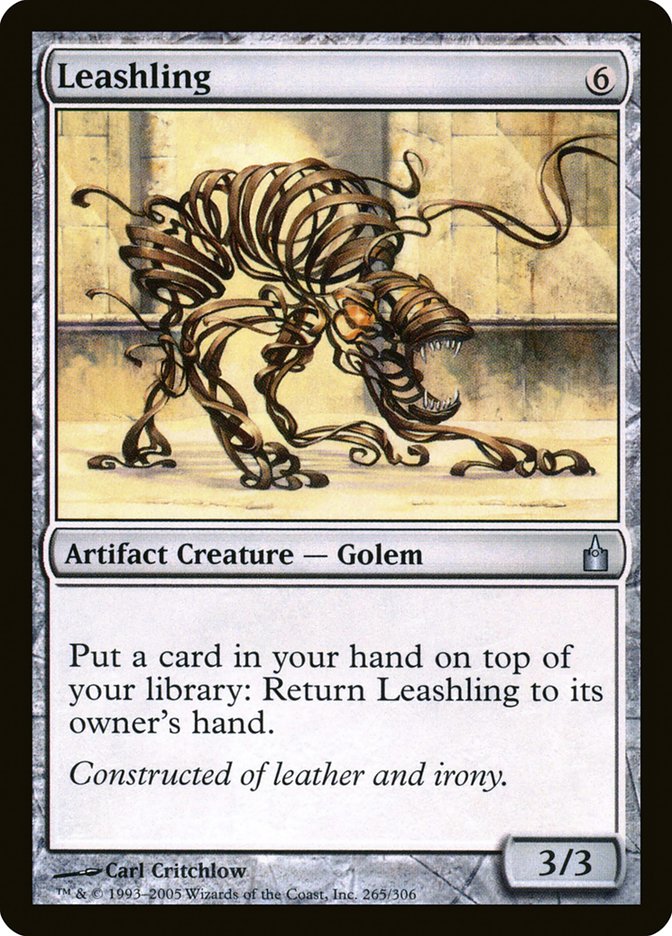Esclavista mental Carta MTG
| Colecciones da carta | Lanzado en 6 coleccionesVer todos |
| El coste de maná | |
| Costo de maná convertido | 6 |
| Rareza | Extraña |
| Tipo | Artefacto legendario |
Texto de la carta
{4}, {T}, sacrificar el Esclavista mental: Ganas el control del próximo turno del jugador objetivo. (Tú ves todas las cartas que ese jugador podría ver y tomas todas las decisiones por él. Ese jugador no pierde vida por quemadura de maná.)
Comprendiendo el Control Único de Mindslaver
Mindslaver es un artefacto excepcional en MTG que ofrece un giro en el control del juego. Comparado con otras piezas de control como Sorcerous Spyglass o Pithing Needle, Mindslaver lo lleva un paso más allá. A diferencia de Spyglass, que mira pasivamente la mano de un oponente e inhabilita habilidades, Mindslaver resulta ser más invasivo. Cuando se activa, le otorga a un jugador el control total del próximo turno de un oponente. Esto abarca todas las decisiones, desde lanzar hechizos hasta combate. Es un movimiento poderoso que puede interrumpir completamente la estrategia de un oponente.
Cartas Similares
En el ámbito del control y manipulación dentro de MTG, Mindslaver destaca por su dominio completo del turno de un jugador. La carta Emrakul, the Promised End refleja este tema, aunque con una condición de reducir su coste aprovechando el contenido del cementerio. Aunque también otorga control sobre el turno de un oponente, se une singularmente al campo de batalla como una criatura formidable en sí misma. Emrakul ofrece una amenaza doble pero requiere una construcción de mazo específica. Worst Fears, otro hechizo potente, refleja la toma de turno de Mindslaver pero como una única hechicería en lugar de un artefacto reutilizable.
Estas cartas, aunque comparten el tema de comandar el juego, difieren en gran medida en aplicación y efecto. Mindslaver, con su capacidad de reutilización dados los recursos de maná suficientes, puede dictar el ritmo y el resultado de múltiples rondas, convirtiéndose en un componente formidable y único en el arsenal de cualquier jugador.
Cartas similares a Esclavista mental por color, tipo y coste de maná
Mazos que usan esta carta
Mazos MTG usando Esclavista mental. Profundiza en la estrategia de los mazos, cartas de aparador, lista de ideas y exportación para jugar en ARENA o MOL.
| # | Nombre | Formato | Arquetipo | Evento |
|---|---|---|---|---|
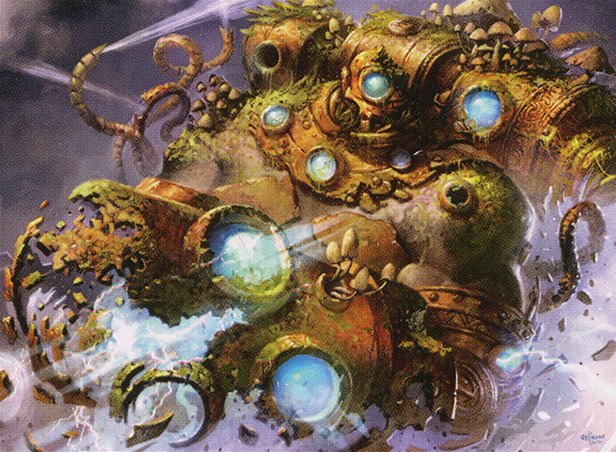 | Five-color Combo | Legacy | Painter | Charlotte Legacy League Season 2 Week 1 |
 | Izzet Upheaval | Modern | Izzet Upheaval | Modern Challenge 64 2024-03-24 |
 | Mono-Blue Tron | Modern | Mono-Blue Tron | Modern Preliminary 2023-12-11 (1) |
 | Azorius Tron | Modern | Mono-Blue Tron | CCG SuperQualifier 5K OPEN | Modern |
 | Tron | Modern | Tron | Modern Preliminary 2024-01-03 (1) |
 | Izzet Tron | Modern | Mono-Blue Tron | Modern Preliminary 2023-12-26 (1) |
 | Mono-Blue Upheaval | Modern | Mono-Blue Upheaval | Modern League 2023-11-28 |
Aspectos positivos de la carta
Ventaja de cartas: Con el artefacto Mindslaver, los jugadores obtienen control impermanente pero potente sobre el próximo turno de su oponente. Esto puede llevar a una ventaja de cartas significativa al poder manipular las acciones del oponente, potencialmente haciéndolo desperdiciar recursos o incluso usar sus propias cartas en su contra.
Aceleración de recursos: Aunque Mindslaver en sí no acelera directamente los recursos, tomar el control del turno de un oponente te permite utilizar sus recursos en su lugar, proporcionándote efectivamente el valor de un turno adicional en términos de maná y acciones mientras los privas de lo mismo. Este tipo de ventaja de tempo puede cambiar el juego en muchos enfrentamientos de MTG.
Velocidad instantánea: Si bien la activación de Mindslaver no es instantánea, prepara el terreno para aprovechar al máximo los conjuros y habilidades instantáneas del oponente. Esto abre oportunidades para interrumpir su estrategia en momentos cruciales, cambiando el rumbo del juego a tu favor de manera tan efectiva como cualquier respuesta rápida que tu propio mazo pueda proporcionar.
Aspectos negativos de la carta
Requisito de descarte: Aunque la carta Mindslaver no pide directamente descartar cartas, puede causar indirectamente una disminución significativa de la mano del jugador. Tomar el control del turno de un oponente a menudo resulta en obligarlos a realizar jugadas desfavorables, que pueden incluir descartar sus cartas valiosas.
Costo de mana específico: Este artefacto requiere seis manás genéricos y cuatro manás Phyrexianos para activarse, lo que implica tener acceso a suficientes puntos de vida para pagar el costo o al color de maná adecuado, generalmente azul. Esta puede ser una limitación importante para mazos multicolores o incoloros que no estén preparados para cumplir con un costo tan alto.
Costo de mana comparativamente alto: Con un costo total que podría llegar a diez manás incluyendo la activación, Mindslaver presenta una inversión significativa. En un juego donde el tempo importa, el costo de desplegar y utilizar Mindslaver puede ser prohibitivo, especialmente cuando se compara con otras piezas de control o combo disponibles en el meta.
Razones para incluir Mindslaver en tu colección
Versatilidad: Mindslaver es una pieza única en mazos orientados a artefactos, que ofrece un efecto poderoso aplicable en varias situaciones. Su capacidad para controlar el turno de un oponente puede cambiar el rumbo de los juegos, convirtiéndolo en una inclusión versátil en numerosas estrategias de MTG.
Potencial de combo: Esta carta se combina excepcionalmente bien con mecánicas de recursión. Al tomar repetidamente el control de los turnos de un oponente, puedes crear un combo de soft-lock, interrumpiendo el plan de juego de tu oponente mientras avanzas tu propio estado en el campo de batalla.
Relevancia en el meta: La relevancia de Mindslaver cambia con el panorama competitivo, pero sigue siendo una herramienta formidable contra mazos de control y combo. En un meta donde un solo turno puede marcar una diferencia significativa, aprovechar esa oportunidad a menudo puede llevar directamente a la victoria.
Cómo vencer
Mindslaver, un artefacto formidable en Magic: The Gathering, posee la habilidad única de controlar el próximo turno de un oponente, potencialmente inclinando el juego a tu favor. Para contrarrestar esta poderosa carta, es crucial tener estrategias establecidas. Cartas como Krosan Grip, que pueden destruir artefactos mientras evitan la activación de habilidades en respuesta, ofrecen una solución directa.
Otro método efectivo es aprovechar la interacción a velocidad instantánea. Mantener cartas como Negar o Prohibir puede interrumpir la activación de Mindslaver, preservando efectivamente tu plan de juego. Además, jugar de manera consciente y con conocimiento de los manás disponibles puede disuadir a un oponente de intentar resolver un turno de Mindslaver que cambie el juego.
En el campo de batalla, mazos agresivos de ritmo rápido pueden presionar a un jugador de Mindslaver antes de que reúna los recursos suficientes para usar la carta de manera efectiva. Contrarrestar a Mindslaver se trata de sincronización, gestión de recursos y mantener una presencia sólida en el campo de batalla. Al adoptar estas estrategias, los jugadores pueden protegerse del dominio abrumador de Mindslaver, manteniendo firmemente su propia estrategia y decisiones.
Recomendaciones de BurnMana
Dominar la carta Mindslaver de MTG puede ser un momento que define el juego, ofreciendo una jugada de alto riesgo que subvierte las dinámicas típicas del juego. No se trata solo de la jugada inicial, sino de construir una relación con las mecánicas únicas de la carta. Saber cuándo desplegar Mindslaver e integrarlo en tu estrategia más amplia es clave. Nuestras discusiones no terminan aquí. Nos adentramos en la optimización de combos y analizamos los cambios en el metajuego para potenciar tus construcciones de mazo con Mindslaver. ¿Listo para aprovechar todo su potencial y superar a tus oponentes con un control incomparable? Explora más con nosotros y deja que Mindslaver se convierta en tu arma secreta en el camino hacia la victoria.
Donde comprar
Si estás buscando comprar una carta MTG Esclavista mental de un coleccione específico como Mirrodin and Scars of Mirrodin, existen varias opciones confiables que debes considerar. Una de las fuentes principales es tu tienda de juegos local, donde a menudo puedes encontrar paquetes de refuerzo, cartas individuales y mazos preconstruidos de colecciones actuales y pasadas. A menudo ofrecen el beneficio adicional de una comunidad donde puedes intercambiar con otros jugadores.
Para un inventario más amplio, particularmente de colecciones más antiguos, mercados en línea como TCGPlayer, Card Kingdom y Card Market ofrecen amplias selecciones y te permiten buscar cartas de colecciones específicos. Las plataformas de comercio electrónico más grandes como eBay y Amazon también tienen listados de varios vendedores, lo que puede ser un buen lugar para buscar productos sellados y hallazgos raros.
Además, el sitio oficial de Magic suele tener un localizador de tiendas y listas de minoristas para encontrar Wizards of the Productos con licencia costera. Recuerde comprobar la autenticidad y el estado de las cartas al comprarlas, especialmente a vendedores individuales en mercados más grandes.
A continuación se muestra una lista de algunos sitios web de tiendas donde puede comprar las Esclavista mental y otras cartas MTG:
 COMPRAR
COMPRAR BurnMana es un socio oficial de TCGPlayer
- eBay
- Card Kingdom
- Card Market
- Star City Games
- CoolStuffInc
- MTG Mint Card
- Hareruya
- Troll and Toad
- ABU Games
- Card Hoarder Magic Online
- MTGO Traders Magic Online
Ver productos MTG
Impresiones
La carta Esclavista mental Magic the Gathering se lanzó en 5 colecciones diferentes entre 2003-10-02 y 2024-04-19. Ilustrado por 3 diferentes artistas.
| # | Liberado | Nombre | Código | Símbolo | Número | Marco | Disposición | Borde | Artista |
|---|---|---|---|---|---|---|---|---|---|
| 1 | 2003-10-02 | Mirrodin | MRD | 206 | 2003 | Normal | Negra | Glen Angus | |
| 2 | 2010-10-01 | Scars of Mirrodin | SOM | 176 | 2003 | Normal | Negra | Volkan Baǵa | |
| 3 | 2020-03-08 | Mystery Booster Retail Edition Foils | FMB1 | 109 | 2003 | Normal | Negra | Glen Angus | |
| 4 | The List | PLST | MRD-206 | 2003 | Normal | Negra | Glen Angus | ||
| 5 | 2024-04-19 | Breaking News | OTP | 63 | 2015 | Normal | Sin fronteras | Gossip Goblin | |
| 6 | 2024-04-19 | Breaking News | OTP | 80 | 2015 | Normal | Sin fronteras | Gossip Goblin |
Legalidades
Formatos de Magic the Gathering donde Esclavista mental tiene restricciones
| Formato | Legalidad |
|---|---|
| Commander | Legal |
| Legacy | Legal |
| Modern | Legal |
| Oathbreaker | Legal |
| Vintage | Legal |
| Duel | Legal |
| Predh | Legal |
| Penny | Legal |
Reglas e información
La guía de referencia para las reglas de las cartas Esclavista mental de Magic: The Gathering proporciona las reglas oficiales, las erratas emitidas, así como un registro de todas las modificaciones funcionales que se han producido.
| Fecha | Texto |
|---|---|
| 04/10/2004 | Solo te permite tomar decisiones que el jugador realmente tomaría. Si otro efecto permite que otro jugador tome decisiones que normalmente tomaría ese jugador, como hacer que otro jugador decida cómo se reparte el daño de combate, entonces el otro efecto tiene prioridad. |
| 01/12/2004 | Si haces que otro jugador lance Shahrazad, no controlas a ese jugador en el subjuego, pero sigues controlándolos una vez que se completa el subjuego. |
| 01/12/2004 | También tomas decisiones para tus permanentes, hechizos y habilidades como de costumbre. |
| 01/12/2004 | No puedes tomar ninguna decisión que no esté indicada o permitida por las reglas del juego, o por cualquier carta, permanentes, hechizos, habilidades, etc. |
| 01/12/2004 | No puedes hacer que el otro jugador se rinda. Un jugador puede optar por rendirse en cualquier momento. |
| 01/12/2004 | Tú eliges qué habilidades activadas activa el otro jugador, y tomas todas las decisiones mientras esas habilidades se activan y cuando resuelven. Por ejemplo, puedes hacer que tu oponente sacrifique sus criaturas a su Nantuko Husk o hacer que el Elfo Vigilamadera de tu oponente le dé a tu criatura bloqueadora +X/+X. |
| 01/12/2004 | Tú eliges qué criaturas atacan y cómo esas criaturas atacantes distribuyen su daño de combate. |
| 01/12/2004 | Tú eliges qué conjuros lanza el otro jugador, y tomas todas las decisiones mientras se lanzan esos conjuros y cuando se resuelven. Por ejemplo, eliges el objetivo para el Shock de ese jugador y qué carta obtiene ese jugador con el Tutor diabólico. |
| 01/12/2004 | Los controlas durante todo el turno, desde el paso de desbloqueo hasta el paso de limpieza. |
| 01/12/2004 | Podrías tomar el control de ti mismo usando Mindslaver, pero tomar el control de ti mismo realmente no hace nada. |
| 01/12/2004 | No controlas los permanentes, conjuros o habilidades de los otros jugadores. |
| 01/12/2004 | Tienes que tomar todas las decisiones que el otro jugador habría tomado durante ese turno. No puedes tomar decisiones ilegales o elecciones ilegales; no puedes hacer nada que el jugador no pudiera hacer. Puedes gastar maná en el banco de maná del jugador solo en los hechizos y habilidades de ese jugador. El maná en tu banco de maná solo se puede gastar en tus hechizos y habilidades. |
| 01/12/2004 | Usted toma todas las decisiones para las habilidades desencadenadas del otro jugador, incluyendo a qué apuntan y cualquier decisión tomada cuando se resuelven. |
| 13/07/2016 | Controlar a un jugador no te permite mirar el banquillo de ese jugador. Si un efecto instruye a ese jugador a elegir una carta de fuera del juego, no puedes hacer que ese jugador elija ninguna carta. |
| 13/07/2016 | Mientras controlas a otro jugador, puedes ver todas las cartas en el juego que ese jugador puede ver. Esto incluye las cartas en la mano de ese jugador, las cartas boca abajo que ese jugador controla y cualquier carta en la biblioteca de ese jugador a la que el jugador pueda mirar. |
